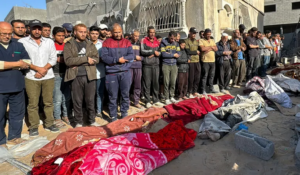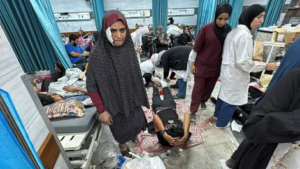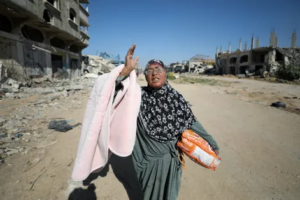Gaza is the horror that can’t be denied. But Israelis will try

Palestinians praying over bodies of relatives killed in an overnight Israeli airstrike in Beit Lahia, northern Gaza, 27 October 2024
Dahlia Scheindlin writes in Haaretz on 27 October 2024:
Trigger warning – and be grateful for it, because I didn’t have one last week when a photo of a girl with half a head appeared on my feed one morning. Her fuzzy pink wrap was almost indistinguishable from the part that was once inside her head, now splayed out around her body. Her face, however, was mostly preserved, her frozen eyes half-closed and yet gazing back at me.
No matter how much photographic, eyewitness and real-time documentation we see, the battle over the truth rages full force. And nothing inflames the debate more than the word “genocide.”
For Palestinians, genocide is a descriptive fact – anything else is a lie. For international courts, it is a legal convention, the International Court of Justice is deliberating South Africa’s charges, according to a high bar of evidence, while ruling that Palestinians have a plausible right to be protected under that convention. For many Israelis, the word is an antisemitic plot and a lie.
Israel’s government already flatly denies lesser charges – war crimes, ethnic cleansing, a second Nakba. But the worse things get in northern Gaza, the more Israeli society activates its long-term modes of denial.
Denying history in the future
Nations rarely want to face their crimes. Israel has made long and elaborate efforts over the years to deny it worst deeds. It’s already clear how this will work in the years and decades to come when thinking about the present.
Israel’s leadership classified the archives related to the Nakba during the War of Independence, while David Ben-Gurion painstakingly cultivated the idea that most Palestinians left at their leaders’ instruction, according to the historian Shay Hazkani. Archives were declassified, scholars pieced together terrible truths, and Israel reclassified the material.
Fellow academics unleashed smear campaigns and interviewees retracted their testimonies to Teddy Katz, whose master’s thesis chronicled a massacre by Israeli forces at Tantura in 1948 (that story is captured in an astonishing, eponymous film). The proto-fascist group Im Tirtzu ran a “Nakba-Bullshit” campaign in 2011.
In recent years, denial efforts often focus on individual cases, picking apart tiny details to prove Israel’s innocence – hoping this adds up to a bigger picture exonerating the occupation at large. Examples of these micro-denials include a cottage industry that emerged over years to prove that 12-year-old Mohammed al-Dura was not killed by Israeli fire in 2000, during the second intifada; or the IDF denials that it had killed Jawaher Abu Rahma with tear gas in 2011, and any number of others.
Justification is another denial strategy, and it’s not unique to Israel. “There is no crime, absolutely none, that cannot be condoned when ‘our’ side commits it,” wrote George Orwell in 1945, before Israel existed. He wrote that nationalists in general employ “flagrant dishonesty” and self-deception.
Fabrication of motives happens too: In 2017, Israeli police claimed it killed the Bedouin Israeli Yakub Abu al-Kiyan because he was an Islamic State terrorist who tried to commit a car-ramming attack; he wasn’t, and he didn’t. If a terrible incident is wrongly attributed to Israel – such as the explosions at the Al-Ahli hospital early in the war, most likely by misfired munitions from Palestinian militias – this is leveraged as proof that Israel is innocent in all other cases.

Palestinian casualties at Kamal Adwan hospital in Jabalya, northern Gaza, on 26 October 2024
Too terrible to admit
Denialism kicks in when events are too terrible to admit. Headlines have shifted to Iran, but Israel is still starving, bombing and expelling the population of northern Gaza. Many suspect it is implementing the “General’s Plan,” which seeks to empty northern Gaza of Palestinians. Developed by former security officials, the plan orders the exit of 300,000-400,000 civilians, then calls to end humanitarian aid alongside bombardment to destroy remaining combatants – or anyone.
This plan closely complements proposals advocated by the Misgav Institute (close with the Kohelet Policy Forum), calling for an Israeli military government in northern Gaza. Members of the governing coalition, including from the ruling Likud party, supplied the final aim, declaring yet again last week their intention to clear Gaza for revival of Jewish settlement.
Yet denialism is everywhere. Both Defense Minister Yoav Gallant and the IDF spokesperson claimed Israel is not implementing the General’s Plan. But officers on the ground in northern Gaza told Haaretz the plan was being implemented openly.
Following months of legal proceedings on a petitions by Israeli nongovernmental organizations for urgent humanitarian relief, the state admitted to the court last week that, indeed, aid was blocked to northern Gaza for weeks but some trucks are now being allowed into Gaza. But the human rights groups observed that trucks cannot reach the northernmost governate, and the north-south route remains mostly blocked. The state pointed to its cooperation with a polio vaccination effort. However, the World Health Organization suspended the campaign in northern Gaza last week due to impossible security conditions.
The IDF says it has expanded the humanitarian zones for Gazans, but Tania Hary, executive director of Gisha, an Israeli NGO working on human rights in Gaza and the lead petitioner, rejects that term: “There is nothing actually humanitarian about the humanitarian zone … there’s not enough aid or shelter for people there, and airstrikes still take place in the zone,” she said in an email. The conditions in Gaza are “fit only for human animals.”
She adds: “Calling it the ‘humanitarian zone’ is a clever way of masking the reality for people who might be troubled if they understood what’s really happening there.”
The normative environment of suppressing knowledge includes the media. Israeli television news editors have avoided showing the human death toll and misery in Gaza all year, by choice. The Committee for the Protection of Journalists counts 128 journalists killed in Gaza, with 15 cases being investigated for possible deliberate targeting due to their work. Israel has shut down Al Jazeera in the region, foreign journalists are unable to enter Gaza unless embedded with the IDF, and last week Israel marked a number of Gazan journalists as terrorists – presumably building a case for killing them.
To be sure, Israel is not alone in denial. Surveys repeatedly show that nearly 90 percent of Palestinians do not believe atrocities were committed on October 7, for example. Remote keyboard activists in faraway countries have entertained themselves denying Hamas’ sexual violence. But right now, it’s the Gaza horror that needs to stop.

A displaced Palestinian woman in Jabalya, late October 2024
Unlikely truth warriors
Given these trends, perhaps the most stunning development of all is the waning of denial – as Israeli officials and individuals increasingly declare Israel’s plans openly, sometimes proudly.
The South African government collected numerous statements by Israeli officials signaling what they argued was genocidal intent in the immediate aftermath of October 7. Yet officials have continued to make them – including Religious Zionism minister Bezalel Smotrich, who said starving Gazans would have been justified, in an August conference devoted to resettling Gaza. Influential media commentators have called for mass killing, including of civilians. IDF units have proudly stated and documented their own actions on social media extolling (and executing) total destruction – easily harvested and chronicled by Drop Site News investigators. It’s not clear which is worse – denying these awful aims, or openly admitting them.
But maybe Israel’s fanatics in power are doing the country a service. People of integrity might not see dismembered children on their feeds or televisions. It’s harder not to hear your own leaders, your own soldiers, your own family members.
Israeli linguistics professor Idan Landau recently gathered overwhelming documentation available from open sources, and created one of the most damning reports yet about northern Gaza, in Hebrew. His blog is called “Don’t die dumb.”
Earlier this month, a group of Israelis wrote an open letter calling on the countries of the world to pressure Israel with all possible sanctions, because “we are horrified by the countless war crimes that Israel is committing … the constant massacres and destruction must be stopped immediately!” Over 3,000 Israelis signed as of this writing.
That letter was written largely by longtime anti-occupation activists. A different petition is now going around social media groups written by education professionals and democracy activists. They observed the accumulation of evidence of war crimes, starvation, expulsion, the “Israeli media obfuscation of the atrocities,” and closed with a plea: “The blood of the children, women, the youth and the elderly of Gaza, who are not Hamas members, will haunt us for generations. We call upon the government of Israel and the IDF: Do not commit war crimes in Gaza.” (Disclosure: I have signed this letter.)
Think tanks are publicly debating whether this is genocide. I have had quiet conversations with people not connected to the radical left, who believe that the combination of open statements and actions in northern Gaza fit the definition of genocide.
Ultimately, incremental steps among small pockets of society can’t stop the carnage fast enough, but knowing is a start. Israel should spare itself the anguished truth debates for decades to come, and many lives, by ending the war in the present.
This article is reproduced in its entirety
